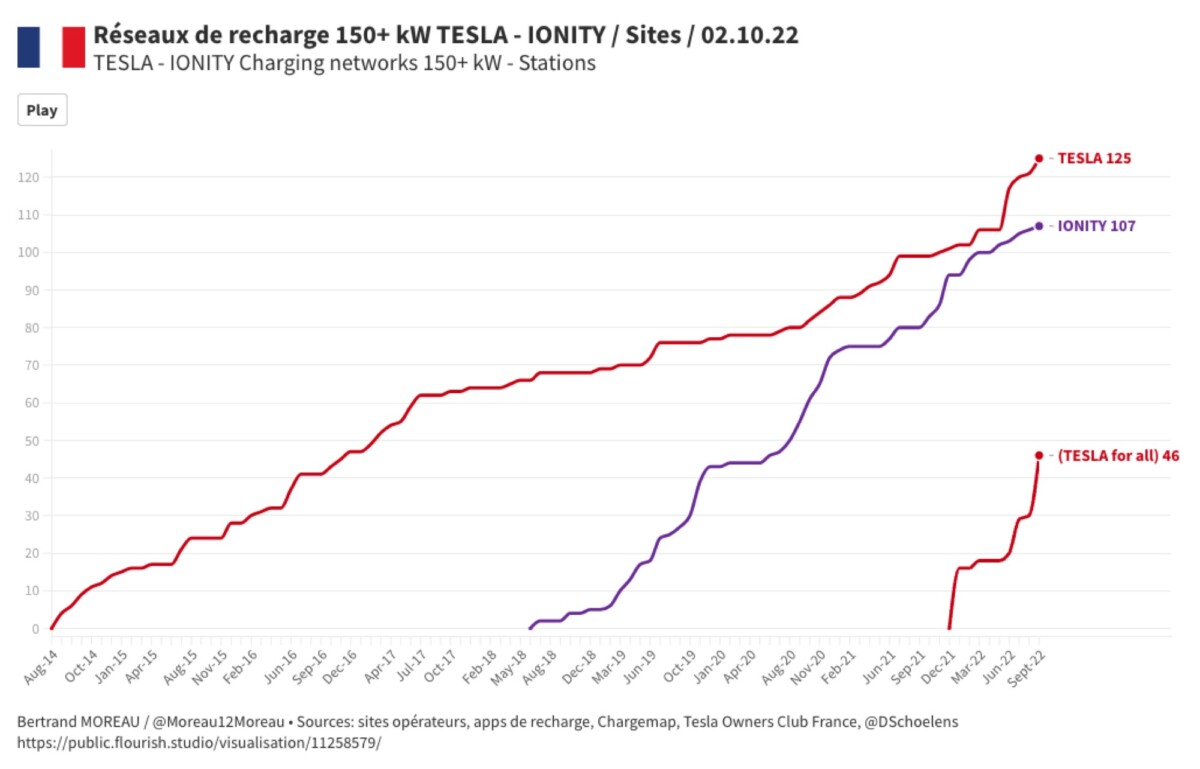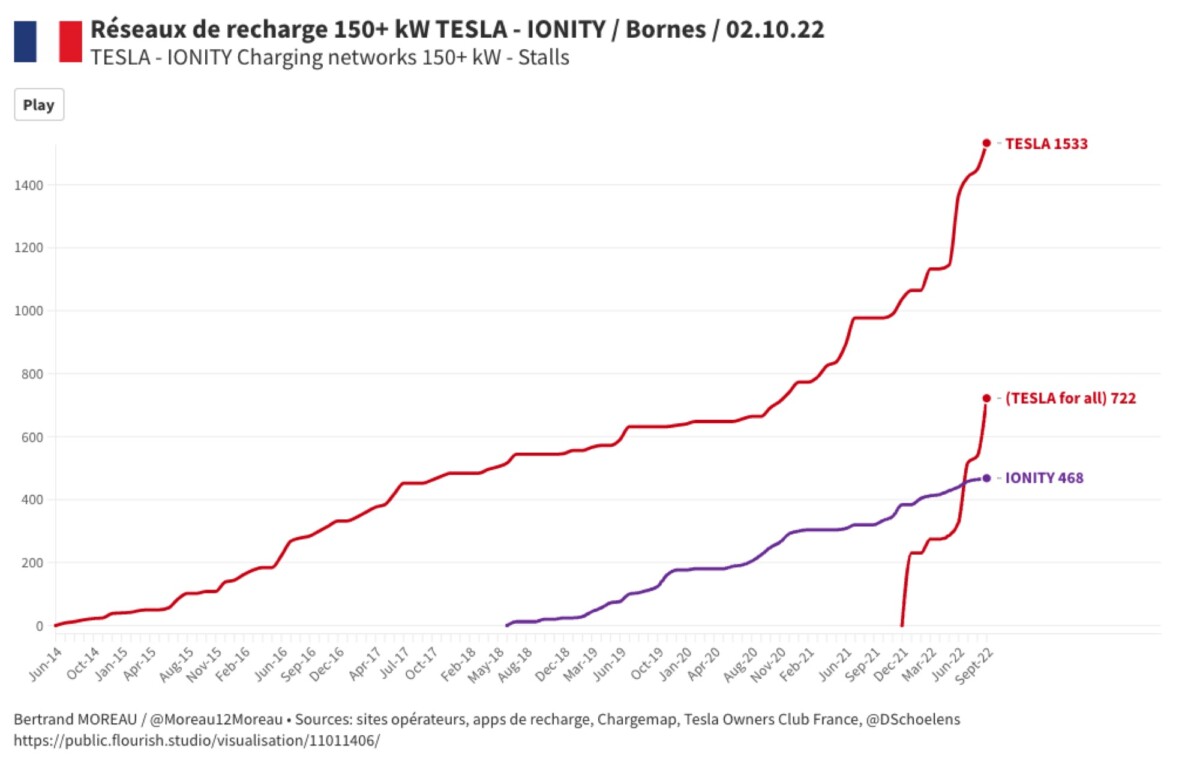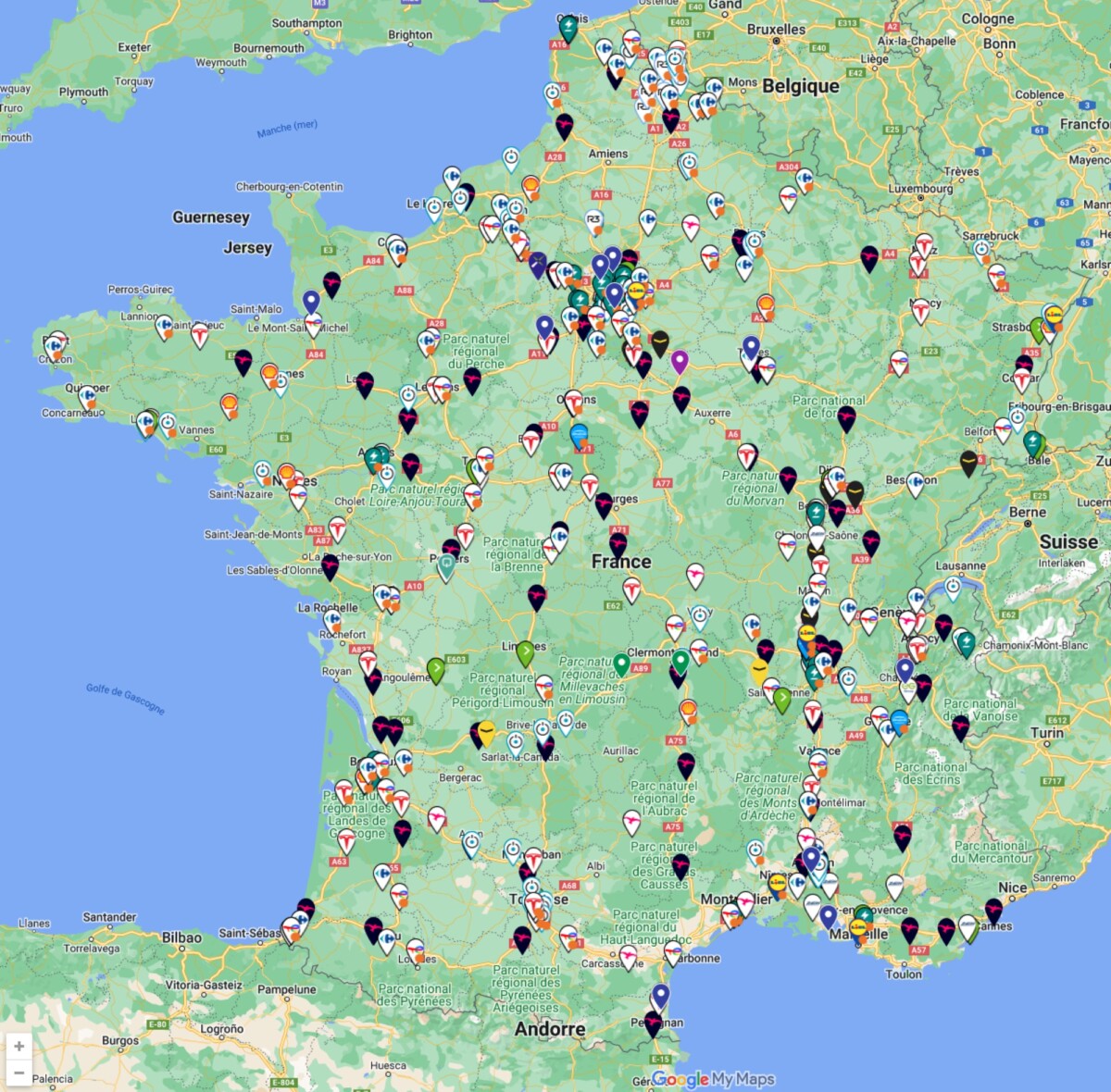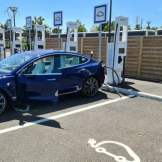The players in fast charging are scrambling to offer an increasingly comprehensive offer to electromobilists. After a year of opening some Tesla Superchargers in Europe, it’s time to take stock of what is also available elsewhere: Ionity, Total Energies, Fastned, Electra, Allego…
Fast charging is at the heart of the concerns of electric car drivers who travel long distances. Indeed, as soon as a trip exceeds the range of your vehicle, you have to stop for a few tens of minutes to get to your destination.
If until 2021, Ionity was the essential network in France and Europe, things have changed with the arrival of various more or less unexpected players. Arguably the biggest shock came in November 2021, when Tesla launched its program to open Superchargers to everyone.
We will go into detail in this file on the key figures of the different networks available, as well as on the main characteristics of each charging operator in terms of location or pricing.
Ionity is getting stronger
In October 2022, Ionity was present throughout the national territory and in the majority of European countries, as shown in the map below. More specifically, these are 431 stations which are already built in Europeand 47 are under construction.

France is rather well endowed with Ionity chargers, since there are no less than 107 stations which are spread over the national territory. Ionity also announces that there are 11 under construction in France, which should fill some of the fast charging deserts that still exist.
The 107 Ionity stations in France represent 470 chargers, an average of 4.4 chargers per station. In terms of prices, Ionity is displayed at €0.69/kWh without subscription, while a subscription at 17.99 euros per month lowers the price to 0.35 €/kWh. To learn more about Ionity, we have dedicated a file to what is undoubtedly the most important network in Europe for fast charging.

An unexpected reversal of the situation took place in November 2021: against Ionity, which was almost in a monopoly situation, Tesla overnight offered some Superchargers to all EVs with a Combo CCS port in Europe.
At the time of writing these lines, no less than 46 Tesla Supercharger stations are open to everyone in France, which is much lower than the 107 Ionity stations in the national territory. But is it really Ionity who leads the dance so far?
Tesla is already the first charging operator for everyone
The pilot program to open Tesla Superchargers to everyone is almost a year old, and today 46 Superchargers in France are open to other vehicles. Tesla has also recently communicated on the progress of its network on the Old Continent:
The Tesla Supercharger network is also the largest public fast charging network in Europe. Launched in November 2021, our Supercharger Access Pilot Program for non-Tesla vehicles has continued to expand to new stations and countries, in line with our mission to accelerate the global transition to sustainable energy. The Pilot Program is now accessible in 14 countries, for a total of more than 4,600 Superchargers distributed in more than 320 stations.
If Ionity can boast of having more stations than Tesla in Europe (431 against 320), the number of charging stations available is clearly in favor of Tesla: 4600 terminals against less than 1900 Ionity terminals.

The same observation can be made in France, where we find 722 Tesla terminals open to all, i.e. more than 50% more than Ionity terminals. The graph above shows you the speed with which Tesla can add terminals to its program of opening Superchargers to non-Tesla vehicles: the infrastructures are already built, all that remains is to authorize the charging of third-party vehicles in software.
Tesla Supercharger stations are now frequently equipped with 20 to 30 terminals charging station, authorizing a new site for non-Tesla vehicles immediately adds the equivalent of five to six Ionity stations in terms of available terminals.

That is why Tesla is currently the leading fast charging operator in France and Europe, if we consider the number of terminals available. For France, we note that there are currently only half of the Tesla terminals open to all, which leaves a comfortable margin for Tesla to maintain its lead over Ionity.
The price at Tesla is not better than Ionity however, since it is necessary to count €0.79/kWh to charge a vehicle of another brand. It is possible to lower this cost to €0.67/kWh in exchange for a subscription at €12.99 per month, which is non-binding.
In addition to the higher price than at Ionity, it should be noted that Tesla Supercharger locations are also rarely on highway service areas, and that a detour of several kilometers is sometimes necessary to get loaded. The notable advantage will come from the availability of terminals in large numbers at each station, which makes the Tesla network preferable during major crossovers.
New actors appear
If the two giants that are Ionity and Tesla today have the majority of fast charging stations for them, this does not prevent other players from arriving on the market, to take a piece of the cake.

The evolution of the number of fast charging stations available from different players // Source: Bertrand MOREAU

The evolution of the number of fast charging stations available from different players // Source: Bertrand MOREAU
Among the networks that are currently more modest, five are significantly established in France for the moment with terminals offering a power of 100 kW or more. It is Total Energies, Lidl, Electra, Allego and Fastned.
Total Energies has been present since 2020 but is still weakly represented with 57 sites and 167 terminals. This should increase in the future, in particular thanks to motorway companies which have announced that their areas will soon be equipped with fast charging.

A retailer, Lidl, strengthens with 59 stations of more than 100 kW, but only one terminal is available each time, which makes stations difficult to recommend on long trips. They are more suitable for locals who need to charge while shopping, which should happen in other hypermarkets as well soon.

Among the other significant actors, we can cite Electra (16 stations, 88 terminals) as a newcomer with strong growth, which offers its fast chargers usually in cities rather than on main roads.
Allego has resumed its establishment since the end of 2021 and now has 42 stations for a total of 155 terminals, while Fastned is struggling to take off with only 9 stations and 44 terminals. The map of stations visible above displays in detail all the existing and future fast chargers in France, if you wish to have more details on the current state of the networks.
Price and charging speed
As far as pricing is concerned, we have summarized the current prices in the table below. Note that these are the prices without subscription, and thatit is sometimes possible to benefit from more attractive rates in exchange for a monthly payment to the operator in question (Fastned, Ionity and Tesla in particular), or via one of the many charging cards available.
| Operator | Price |
|---|---|
| ionity | €0.69/kWh |
| You’re here | €0.79/kWh |
| Total energies | €0.65/kWh |
| Fastned | €0.59/kWh |
| Electra | €0.44/kWh |
| Allego | €0.98/kWh |
For the moment, Electra is in the best position with a cost of €0.44/kWh. On the other side, we find Allego which flirts with the symbolic bar of one euro, since its price is €0.98/kWh. Among the other three, the ranking in order of price at the time of writing these lines is: Fastned (€0.59/kWh), Totalenergies (€0.65/kWh) and Tesla (€0.79/kWh).
Finally, with regard to the charging powers of each network, we have summarized them in the table below, bearing in mind that this corresponds to the maximum powers offered by the terminals, and not to the charging power of a car that plugs into it.
| Operator | Maximum power |
|---|---|
| ionity | 350kW |
| You’re here | 250kW |
| Total energies | 175kW |
| Fastned | 300kW |
| Electra | 300kW |
| Allego | 300kW |
Totalenergies is currently the last player in the ranking with a maximum power of 175 kW, then comes Tesla with its 250 kW Superchargers. Fastned, Electra and Allego all offer a power of 300 kW. Finally, Ionity announces a maximum power of 350 kW.
Complementary networks
If the current major players can be summed up in two words (Tesla and Ionity), you will find that the fast charging market is booming, and it is likely to change very quickly. Energy giants, like Total Energies, are seriously starting to establish themselvesoffering even more choices to electric motorists.
Supermarkets will gradually become essential in fast charging, and Lidl has taken a bit of a lead in this segment. Finally, Tesla, with its presence in Europe, will continue to open its stations to all vehicles, and should keep a substantial lead over its future rivals.
So far, Tesla remains the only one to offer so many terminals per location. Where Ionity, Fastned or Total Energies opens a station at the end of 2022 with six charging stations, Tesla opens one with no less than thirty locations.
However, it is necessary to accept very high rates for fast charging, which costs up to 20 euros per 100 kilometers for many electric cars. If daily trips remain very inexpensive, unfortunately the same can no longer be said of long trips.
To follow us, we invite you to download our Android and iOS application. You can read our articles, files, and watch our latest YouTube videos.


